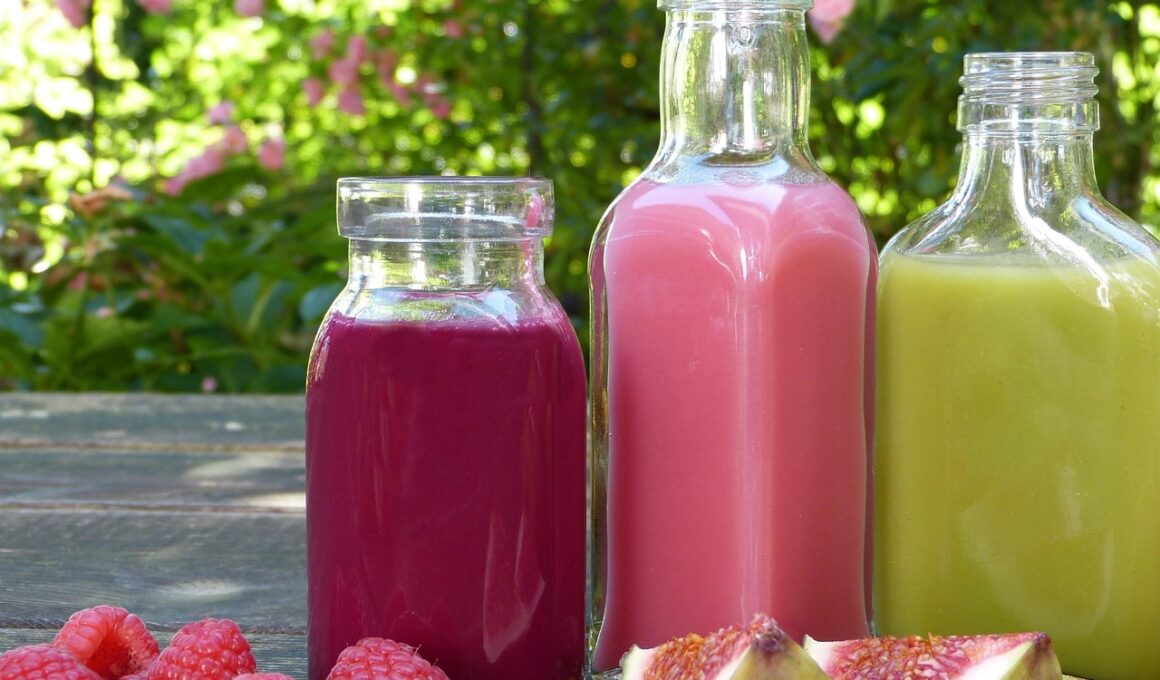Mythbusting Detox: What Your Body Really Needs
Detox diets are often marketed as a quick fix for weight loss and health improvement, but many of these claims are overstated or downright false. The body is naturally equipped with organs like the liver, kidneys, skin, and lungs that detoxify and eliminate toxins efficiently. These organs work continuously, without the need for expensive juices or supplements. Instead of relying solely on detox diets, adopting a balanced diet rich in whole foods, fiber, and antioxidants is crucial. This approach helps the body perform its natural detoxification. Foods such as leafy greens, fruits, vegetables, nuts, and seeds promote healthy digestion and liver function. In addition, hydration plays a key role in supporting detoxification; drinking adequate water aids kidney function and helps eliminate waste. Following detox diets can sometimes lead to nutrient deficiencies and energy depletion, counteracting the intended benefits. Understanding the myths surrounding detox can help people make informed dietary choices. Instead of quick fixes, focus on long-term health and nutrition. Prioritizing a healthy, sustainable diet will yield better long-term results than any temporary detox fad.
One common misconception is that detox diets will cleanse the body of harmful substances accumulated from the environment. However, the body is designed to handle toxins effectively. While certain foods can enhance detoxification, like garlic and beetroot, overemphasizing detox diets may undermine realistic expectations. These diets often promise significant weight loss in a short time, rendering them appealing. Yet, rapid weight loss can lead to muscle loss and fat regain after returning to a normal diet. Food restrictions in detox diets can trigger cravings, often resulting in unhealthy bingeing later. Instead of focusing narrowly on detox, consider a broader view of health. Incorporate nutrient-dense foods into your daily meals while maintaining healthy eating patterns. This approach not only supports natural detoxification processes but also promotes a balanced lifestyle. It’s essential to recognize that no single food or diet can magically rid the body of toxins. Moreover, sustainable lifestyle changes yield the best health results. Therefore, commit to making gradual, lasting changes rather than seeking quick-fix solutions through rigorous detox diets.
Additionally, it’s important to consider the psychological effect of detox diets. Often, they foster an unhealthy relationship with food by categorizing it as “good” or “bad.” This can lead to feelings of guilt or shame associated with eating certain foods, which may be detrimental to one’s mental health. Furthermore, many detox plans promote excessive calorie restriction, which can precipitate disordered eating patterns. Listening to your body’s hunger and fullness cues is vital. Fostering a positive mindset towards food will contribute to overall wellness. Healthy eating shouldn’t be about deprivation but rather about nourishment. For most people, a well-rounded, nutrient-dense diet is not only more enjoyable but also more effective. Regular exercise paired with balanced nutrition will naturally facilitate the body’s ability to detoxify and maintain health. Long-term success comes from building habits that you enjoy and can maintain. Integrating physical activity, mindfulness, and self-care into daily routines can enhance the effects of any dietary approach. Always consult with a healthcare professional or nutritionist when considering significant dietary changes for personalized guidance.
The Importance of Whole Foods
Whole foods play a crucial role in supporting the body’s natural detoxification system. These foods are minimally processed and packed with essential vitamins, minerals, and antioxidants that help neutralize harmful free radicals. Foods rich in fiber, such as whole grains, beans, and fruits, assist in regular bowel movements—an essential aspect of detoxification. Regularly consuming fibrous foods helps to flush out toxins and supports a healthy gut microbiome. Moreover, hydration complements whole-food consumption, as ample water intake is necessary for kidney function and toxin elimination. Herbal teas, like dandelion and green tea, can also support liver health and encourage detoxification. While some people may be tempted by trendy detox juice cleanses, these practices often lack substantial nutrients and can leave individuals feeling fatigued. Increasing whole food intake fosters satiety and helps in managing cravings while enhancing overall energy levels. Making simple meals using whole ingredients can have profound health benefits. Total health does not stem solely from detox methods but rather from a consistent commitment to nourishing the body through whole foods and sustainable lifestyle changes.
Social media and wellness influencers frequently promote dubious detox products, creating confusion regarding their efficacy. Products claiming to detoxify the body or eliminate fats quickly can mislead potential users. In many cases, these products lack scientific backing or are based on misleading studies. Detox products can also lead to unnecessary spending, which is a concern, especially when they do not deliver the promised results. Weight loss is primarily about caloric balance: consuming fewer calories than you expend is what leads to weight loss, not solely relying on detox. Furthermore, the long-term sustainability of detox products and diets is often questionable, with many individuals reverting to previous eating habits once the detox period ends. Education is vital, and individuals should scrutinize product claims and conduct thorough research before committing money or time. Seek professional advice from registered dietitians or nutritionists if unsure about detox programs. They can offer guidance based on your specific health needs. Remember, a balanced diet and regular exercise will always be the most effective approaches to achieving and maintaining a healthy lifestyle.
Another prominent myth is that lavish detox diets will enhance energy levels and improve mental clarity. While individuals may feel lighter during a juice cleanse due to limited calorie intake, this energy boost is usually temporary. Prolonged fasting or severely limiting caloric intake can lead to fatigue, irritability, and brain fog. Instead, maintaining stable energy levels involves consistently consuming well-rounded meals containing carbohydrates, proteins, and healthy fats. Foods like nuts, avocados, and whole grains serve as excellent sources of energy. Moreover, regular meal patterns contribute to sustained energy throughout the day. Pairing nutritious food with adequate rest and exercise can significantly enhance focus, productivity, and overall well-being. Rather than relying on short-term detoxification methods, consider implementing daily practices that support mental and physical health. Engaging in mindfulness through practices like yoga or meditation can promote a balanced and tranquil mindset. By approaching health holistically, individuals can ensure longevity, resilience, and the energy needed to enjoy life fully. Prioritize constant care for both body and mind, rather than seeking superficial detox solutions.
Conclusion: A Balanced Approach to Wellness
Ultimately, the truth about detox diets is that they aren’t the miraculous solutions many advertisements promise. Instead, the body’s natural detoxification processes do the heavy lifting when given the right tools. Education on nutrition and understanding the body’s needs are vital components of establishing a balanced lifestyle. Avoiding shortcut detox trends and instead embracing rich, nutrient-dense foods will help maintain optimal health. Physical activity, ample hydration, and consistent sleep patterns also support body functions. Recognizing that health is an ongoing journey encourages a positive relationship with food and fosters personal growth. It’s essential to listen to your body and respond mindfully to its signals, ensuring a deeper connection with one’s well-being. This approach builds resilience and long-term vitality. Consider starting with small, manageable dietary changes that enrich daily meals. Remember, lasting health is about creating habits, not quick fixes. A balanced approach aligns with nourishing the body responsibly, prioritizing diet, and overall wellness. Evaluate any claims surrounding detox diets critically, ensuring to consult health professionals for informed decisions regarding your path to well-being.
In summary, understanding detox diets clearly reveals that they are not the solutions they appear to be. Rather, the body is inherently capable of detoxifying itself through natural processes. Further, consuming a varied diet emphasizing whole foods transcends the need for restrictive diets designed for short-term gain. Being mindful of food choices alongside engaging in nutritious and energizing foods proves beneficial for overall health. Sustainable changes yield lasting results. It’s vital to scrutinize detox claims, ensuring not to fall for quick-fix marketing techniques. Instead, focus on long-term agricultural methods such as meal planning and incorporating more whole best practices. The misinformation surrounding detox diets dangers individual health while promoting expectations that are often unrealistic. Engaging with health professionals is strongly recommended when navigating dietary changes enables informed choices, fostering a journey towards well-being. Recognize the value of holistic health—encompassing both mind and body in pursuit of wellness. Prioritizing balance in nutrition, physical activity, mental health, and rest creates extensive benefits. Discard myths and embrace empowering choices to build a life for optimal health, well-being, and happiness.





